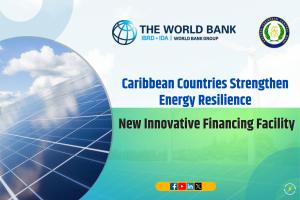Caribbean Countries Strengthen Energy Resilience via New Facility
Caribbean Countries Strengthen Energy Resilience via New Facility
Heavy dependence on imported fossil fuel, used for over 90 percent of power generation in the Caribbean, has long posed a major fiscal vulnerability for the region. Between 2016 and 2021, fossil fuel imports in the Eastern Caribbean averaged US$444 million per year, accounting for 15.4 percent of total imports and 17.1 percent of the trade balance. Grenada, Saint Lucia, and Saint Vincent and the Grenadines rank among the most expensive electricity tariffs globally. Further, progress toward renewable energy has been slow. As of 2022, only
11.6 percent of electricity generation in the region came from renewable sources with major obstacles to increasing its adoption including small project sizes, underprepared grids, fragmented regulations, weak institutional capacity, and high vulnerability.
To confront these barriers, the US$110 million initiative will take a unique approach— providing solutions by bringing together stakeholders from the energy and financial sectors. At the regional level, the Facility will aggregate renewable energy projects across countries to reduce costs, increase scale, and attract private sector developers. As part of its core country- level activities, the Facility will also finance the modernization and reinforcement of electricity transmission and distribution systems—including the installation of battery energy storage systems—to support the integration of renewable energy and strengthen resilience. To help attract private investment, commercial credit up to US$120 million will also be mobilized by offering partial credit guarantees, thereby improving access to finance for renewable energy projects.
“Across the Caribbean residents are paying some of the highest electricity prices in the world, which places a strain on households and businesses,” said Lilia Burunciuc, World Bank Division Director for the Caribbean. “Through this project, we want to help to lower costs and improve the reliability of electricity by investing in renewable energy and resilient infrastructure. This is about creating a more secure and affordable energy future for Caribbean communities.”
The initiative will also deliver comprehensive technical assistance and training to national and regional stakeholders, helping to streamline project preparation, regulatory compliance, and risk mitigation. To further strengthen the region’s capacity, the project will help design and launch a new insurance product, in partnership with the Caribbean Catastrophe Risk Insurance Facility, to protect renewable energy infrastructure against damage from catastrophic events. These investments will create short and long-term employment opportunities in the energy sector. Further, the Facility will support the strengthening and development of energy sector skills through tailored scholarship and apprenticeship programs.
“We cannot transform our region without a transition to renewable energy” said Timothy N. J. Antoine, Governor of the Eastern Caribbean Central Bank. “This Facility is an important vehicle for our journey to build institutional and generating capacity, enhance energy security, boost competitiveness and lower electricity prices for our families and businesses. We acknowledge the support of the World Bank Group and invite other countries and partners to join us as we accelerate our region’s transition to renewable energy.”
The project is financed through the World Bank’s International Development Association, the arm of the World Bank Group which supports low-income countries and small island economies. IDA's grants and low-interest financing help countries invest in their futures, improve lives, and create safer, more prosperous communities around the world. Additional support is also provided by the Climate Investment Fund, the Energy Sector Management Assistance Program and the Canada Clean Energy and Forests Climate Facility.
CONTACTS:
Eastern Caribbean Central Bank
Project Lead: Kieran St. Omer: Kieran.stomer@eccb-centralbank.org
Media Contact: Shermalon Kirby: info@eccb-centralbank.org
Learn more about ECCB’s work:
Website: www.eccb-centralbank.org
Visit us on Facebook: https://www.facebook.com/eccbconnects
For our YouTube channel: https://www.youtube.com/@eccbconnects2295
Shermalon Kirby
Eastern Caribbean Central Bank
869-465-2537
email us here
Visit us on social media:
Facebook
X
LinkedIn
Instagram
YouTube
Legal Disclaimer:
EIN Presswire provides this news content "as is" without warranty of any kind. We do not accept any responsibility or liability for the accuracy, content, images, videos, licenses, completeness, legality, or reliability of the information contained in this article. If you have any complaints or copyright issues related to this article, kindly contact the author above.
Commemorating Three Decades of ERA Environmental Software Solutions
Israeli startups to compete for $1M prize from Startup World Cup
Rony Jabour to Speak on Workplace Safety at NSC Congress & Expo 2025 in Denver
Kalendarium
Więcej ważnych informacji
 Jedynka Newserii
Jedynka Newserii

 Jedynka Newserii
Jedynka Newserii

Prawo

Rząd zapowiada nową strategię wspierającą polski kapitał. Rodzimym firmom przyda się promocja ze strony instytucji państwowych
Premier Donald Tusk podczas otwarcia wiosennej odsłony Europejskiego Forum Nowych Idei zapowiedział nową politykę gospodarczą, opartą na odbudowie i repolonizacji krajowej gospodarki. Przy wyborze wykonawców w państwowych inwestycjach mają być promowane polskie firmy, a zadaniem administracji ma być dbanie o interes narodowy. – Wydaje mi się, że powinniśmy jednak przede wszystkim patrzeć na to, kto i jak skutecznie będzie wspierał polskie firmy, inwestycje, bo to jest to, czego potrzebujemy – ocenia dr Henryka Bochniarz, przewodnicząca Rady Głównej Konfederacji Lewiatan.
Finanse
Członek RPP spodziewa się obniżki stóp procentowych już w maju, może nawet o 50 pb. Potem dyskusja o kolejnej obniżce możliwa w lipcu

Nie najlepsze dane z gospodarki w I kwartale roku oraz inflacja o połowę niższa niż w chwili ostatniej obniżki stóp – to zdaniem Ludwika Koteckiego, członka RPP, wystarczająco mocne powody przemawiające za cięciem kosztu pieniądza już na majowym posiedzeniu. W grze może być nawet 50 punktów bazowych na początek, a do końca roku dwa razy tyle. Podwyższona niepewność w globalnej gospodarce spowodowana polityką administracji w Waszyngtonie to dodatkowy czynnik, który powinien wesprzeć decyzję o poluzowaniu polityki pieniężnej.
Prawo
Trwają prace nad nową ustawą o Rzeczniku MŚP. Urząd zyska nowe kompetencje

Zgodnie z procedowaną ustawą Rzecznik Małych i Średnich Przedsiębiorców stanie się Rzecznikiem Praw Przedsiębiorców i zyska nowe uprawnienia. Wśród nich najważniejsze to możliwość reprezentowania wszystkich przedsiębiorstw, niezależnie od ich wielkości, i rolników, a także inicjatywa ustawodawcza. Ustawą w kolejnych tygodniach ma się zająć rząd.
Partner serwisu
Szkolenia

Akademia Newserii
Akademia Newserii to projekt, w ramach którego najlepsi polscy dziennikarze biznesowi, giełdowi oraz lifestylowi, a także szkoleniowcy z wieloletnim doświadczeniem dzielą się swoją wiedzą nt. pracy z mediami.








.gif)

 |
| |
| |
|